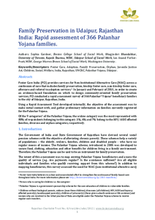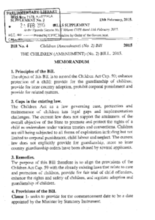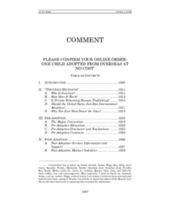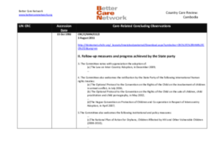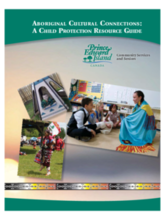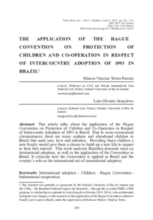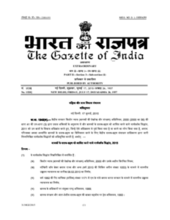Displaying 461 - 470 of 660
In January and February of 2015, in order to create an evidence-based foundation on which to design community-oriented family preservation services, FCI conducted a rapid assessment survey of 366 Palanhar Yojana beneficiary families in the city of Udaipur, Rajasthan, India.
In 2015, the Parliament of the Republic of Uganda considered the Children Amendment Bill, which has several implications for children’s care in the country. The object of the bill is to amend the Children Act Cap. 59, enhance protection of a child, provide for the guardianship of children, provide for inter country adoption, prohibit corporal punishment, and provide for related matters.
In this comment, published in the Houston Law Review, the author, Destinee Roman describes and assesses the practice of “re-homing” adopted children.
This country care review includes the care related Concluding Observations adopted by the Committee on the Rights of the Child.
This report discusses concerns raised by participants of Thematic Area 3 (Intercountry Adoption Agencies and the HCIA) of the International Forum on Intercountry Adoption and Global Surrogacy held in August 2014.
This edited volume introduces the complexity of intercountry adoption and gives voice to the many sides of the intercountry adoption debate – for, against, and the ranges in between.
This resource guide offers a fairly comprehensive guide to engaging with the Aboriginal community on Prince Edward Island, Canada. It includes a history of the use of residential schools for Aboriginal children, as well as a description of the widespread removal of Aboriginal children from their families and communities for adoption placement in the 1960s through the 1980s.
This article talks about the application of the Hague Convention on Protection of Children and Co-Operation in Respect of Intercountry Adoption of 1993 in Brazil.
This paper forms Part 1 of a two-part discussion paper on Indigenous custom adoption.
These Guidelines govern the adoption procedure of orphan, abandoned and surrendered children in India, replacing the Guidelines Governing the Adoption of Children, 2011.

